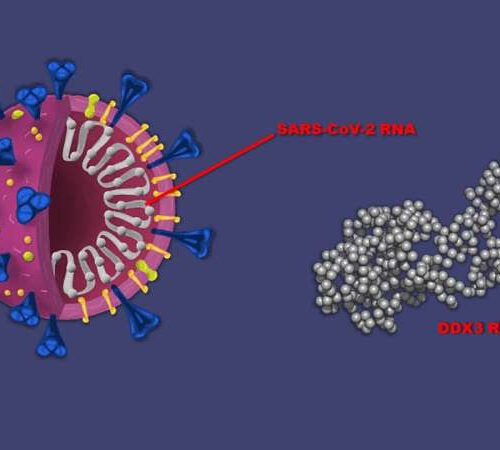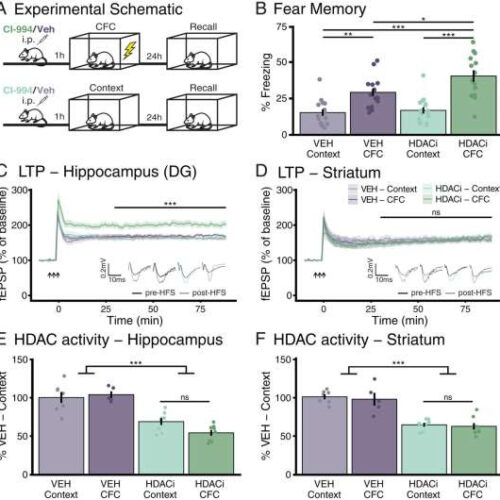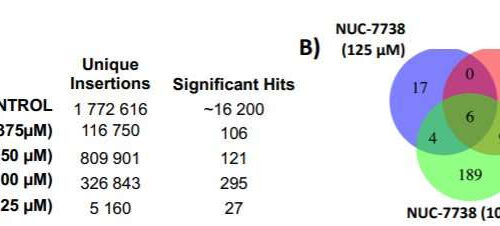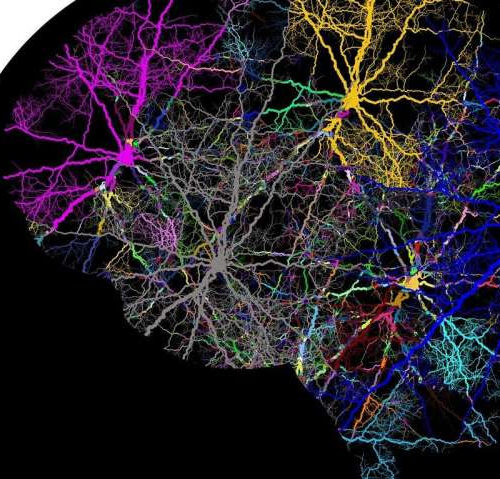by Johns Hopkins University School of Medicine Cutaway view (left) of SARS-CoV-2, the virus that causes COVID-19, showing its double stranded RNA genome. During infection, the virus takes over a host cell’s DDX3 RNA helicase protein (right) to unwind the viral RNA and enable it to be copied. A new study shows that a Johns...
Tag: <span>Anti-cancer drug</span>
An anti-cancer drug acts as an epigenetic memory aid, scientists find
by Hillary Sanctuary, Ecole Polytechnique Federale de Lausanne HDACi treatment enhances contextual fear memory formation and hippocampal, but not striatal LTP, despite reducing HDAC activity in both brain regions. (A) Schematic of the experimental outline. (B) HDACi combined with CFC increases the percent of time spent freezing (>1 s) during 3-min reexposure to the conditioning chamber...
Anti-cancer drug derived from fungus shows promise in clinical trials
by University of Oxford Figure 1. Genome wide haploid genetic screen identifies genes necessary for the activity of 3′-dA and NUC-7738. A) Number of unique gene trap sense insertions and significant gene hits found in the haploid genetic screen. B) Venn diagram indicating the overlap of significant hits found for NUC-7738 treatment. Credit: 10.1158/1078-0432.CCR-21-1652 A new...
New generation anti-cancer drug shows promise for children with brain tumours
by Walter and Eliza Hall Institute of Medical Research Credit: Pixabay/CC0 Public Domain A genetic map of an aggressive childhood brain tumor called medulloblastoma has helped researchers identify a new generation anti-cancer drug that can be repurposed as an effective treatment for the disease. This international collaboration, led by researchers from The University of Queensland’s (UQ) Diamantina Institute and WEHI,...
DRUG COCKTAIL PROVES TOXIC TO LEUKEMIA
A combination of drugs that affect mitochondria—the power plants inside cells—may become the best weapons yet to fight acute myeloid leukemia, according to new research. Researchers found that mitocans, anti-cancer drugs that target mitochondria, are particularly adept at killing leukemia cells, especially when combined with a glycolytic inhibitor, while leaving healthy blood cells in the...
Researchers develop new drug that fights cancer with less renal toxicity
by National University of Singapore A team of pharmacists and chemists from the National University of Singapore (NUS) has developed a new anti-cancer drug that has less toxic effects to the kidneys. The new drug works like a “magic bullet” that is delivered directly to the mitochondria—the power generators of cells—of cancer cells. Once the drug reaches the tumor, two active molecules—an anti-cancer drug and a sensitizer—are released at once,...
New method promises fewer side effects from cancer drugs
A recent achievement in the field of protein research allows for better tailored pharmaceuticals with fewer side effects; the method was developed by two University of Copenhagen researchers FACULTY OF SCIENCE – UNIVERSITY OF COPENHAGEN Protein research is one of the hottest areas in medical research because proteins make it possible to develop far more effective pharmaceuticals for...
Scientists develop novel drug that could potentially treat liver cancer more effectively
A research team led by scientists from the Cancer Institute of Singapore (CSI Singapore) at the National University of Singapore (NUS) has developed a novel peptide drug called FFW that could potentially stop the development of hepatocellular carcinoma (HCC), or primary liver cancer. This landmark discovery opens the door for more effective treatment of liver cancer with...
Drug compound stops cancer cells from spreading in mice
Fighting cancer means killing cancer cells. However, oncologists know that it’s also important to halt the movement of cancer cells before they spread throughout the body. New research, published today in the journal Nature Communications, shows that it may be possible to freeze cancer cells and kill them where they stand. Raymond Bergan, M.D., Division Chief...
Anti-cancer drug gets a boost when combined with antirheumatic
The figure shows a close-up of the histone protein region of a nucleosome core particle in which two different drugs (auranofin and RAPTA-T) are bound. Scientists at EPFL and NTU have discovered that combining an anticancer drug with an antirheumatic produces improved effects against tumors. The discovery opens a new path for drug-drug synergy....




